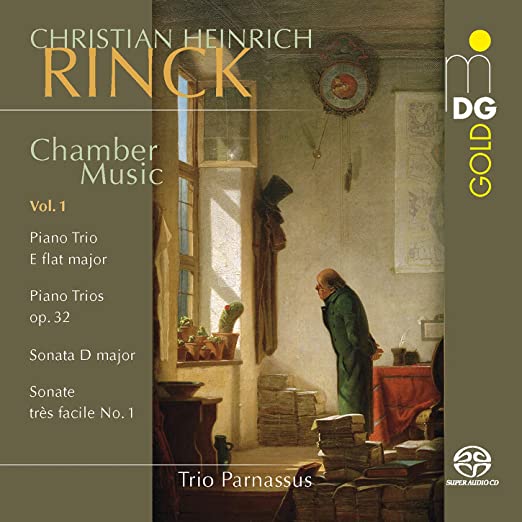

Sonata in D major (for violin, cello and piano) Piano Trios Op. 32 - Trio No. 1 in F major - Trio No. 2 in G major - Trio No. 3 in A major Sonate très facile in B flat major (for violin and piano) Piano Trio in E flat major
Not only are we marking the 250th anniversary of the birth of Beethoven this year (2020), but another German composer is also celebrating the same 250th. But don't worry, he's not here to crash Beethoven's party. Johann Christian Heinrich Rinck (1770-1846) is better known as a celebrated organist and composer who's writing was focused primarely on works for the organ. One of his most influential works was a six-volume organ method titled Practical Organ School still in use today. He also composed some vocal works, a handful of piano pieces, as well as some chamber music. No concertos, symphonies or operas, as he seemed more focused on the pedagogical value of short-form works for the solo instrumentalist.
As already manifest, this year will be overwhelmed with both re-issues and new recordings of the music of LvB, so it's nice to see the Trio Parnassus diverting their focus on another composer's music. One of this ensemble's best traits is their ability to stray from the pack, and perform chamber music by fringe or lesser-known composers like Boëllmann, Gade, Godard, Molique, etc ... with great conviction, musicianship, and an interpretative approach unique to each composer's style. In this case, they uncover the less-is-more Haydn style strongly present within Christian Heinrich Rinck's music. Beethoven and Rinck may have been the same age and living in the same country, but their musical temperaments are worlds apart. Through Sturm und Drang Beethoven seeked a higher purpose in music, whereas Rinck was content with upholding tradition through unostentatious innovation. His music is simple, straightforward, upbeat (notice the constant use of major keys).
And true to form, the members of the Trio Parnassus bring out this music's elegance, nobility, restraint, and highly "classical" structure and sunny disposition. And as always with the MDG audio engineering side of things, perfect balance between the instruments is achieved through a natural perspective and optimal positioning, funneling all three instruments front and centre. Required listening for its historical value as a piece of the greater musical puzzle!
Jean-Yves Duperron - June 2020